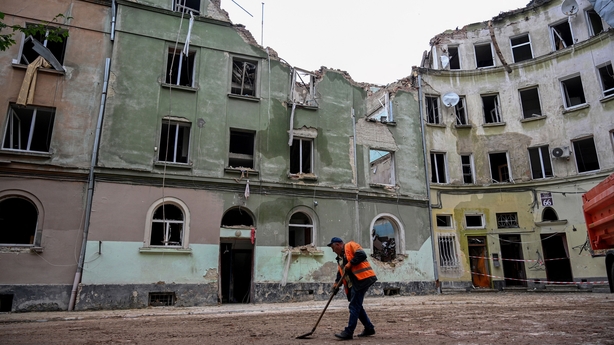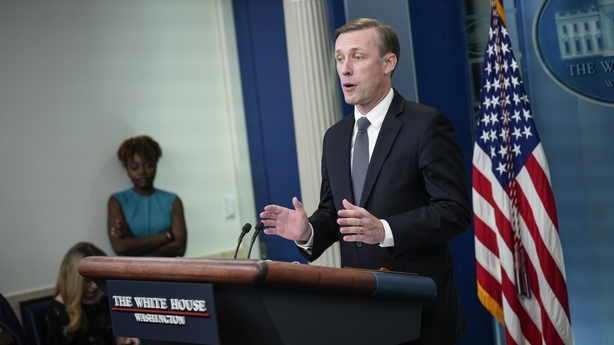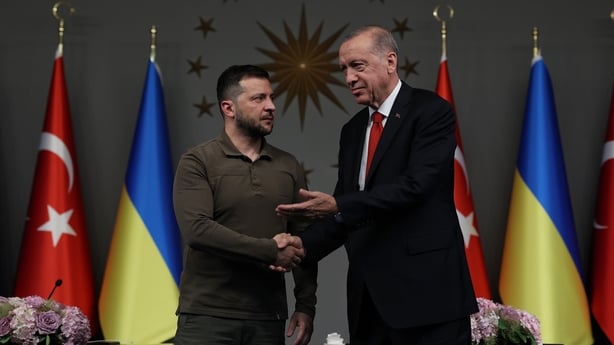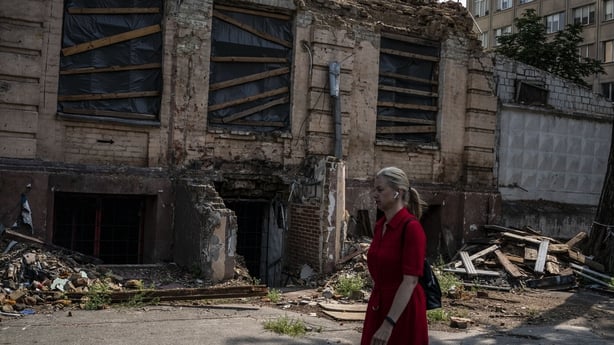Ukrainian President Volodymyr Zelensky returned from a visit to Turkey bringing home five former commanders of Ukraine's garrison in Mariupol despite a prisoner exchange last year under which the men were meant to remain in Turkey.
Russia immediately denounced the release of the men.
Kremlin spokesman Dmitry Peskov said Turkey had violated the prisoner exchange terms and had failed to inform Moscow.
The commanders, lionised as heroes in Ukraine, led last year's defence of the port, the biggest city Russia captured in its invasion.
Thousands of civilians were killed inside Mariupol when Russian forces laid the city to waste during a three-month siege.
The Ukrainian defenders held out in tunnels and bunkers under the Azovstal steel plant, until they were finally ordered by Kyiv to surrender in May last year.
Moscow freed some of them in September in a prisoner swap brokered by the Turkish government, under terms that required the commanders to remain in Turkey until the end of the war.
"We are returning home from Turkey and bringing our heroes home," said Mr Zelensky who met Turkish President Tayyip Erdogan for talks in Istanbul on Friday.
"Ukrainian soldiers Denys Prokopenko, Svyatoslav Palamar, Serhiy Volynsky, Oleh Khomenko, Denys Shleha. They will finally be with their relatives," he said on the Telegram messaging app.
Mr Peskov told Russia's RIA news agency: "No one informed us about this. According to the agreements, these ring leaders wereto remain on the territory of Turkey until the end of the conflict."
Mr Peskov said the release was a result of heavy pressure from Turkey's NATO allies in the run-up to next week's summit of the military alliance at which Ukraine hopes to receive a positive sign about its future membership.
In his remarks, Mr Zelensky gave no explanation for why the commanders were being allowed to return home now.
Turkey's Directorate of Communications did not immediately respond to a request for comment.
President Zelensky posted a one-minute video showing himself and other officials shaking hands and hugging the smiling commanders before they boarded a Czech airplane together.
Many Ukrainians hailed the news on social media.
"Finally! The best news ever. Congratulations to our brothers!" Major Maksym Zhorin who is now fighting in eastern Ukraine, said on the Telegram messaging app.

US to send Ukraine cluster bombs
The United States has announced it will supply Ukraine with widely banned cluster munitions for its counteroffensive against occupying Russian forces, and NATO's leader said the military alliance would unite at a summit next week on how to bring Ukraine closer to joining.
Rights groups and the United Nations secretary-general questioned Washington's decision on the munitions, part of an $800 million security package that brings total US military aid to more than $40 billion since Russia's February 2022 invasion of Ukraine.
Russian President Vladimir Putin, who describes the conflict as a "special military operation" to protect Russian security, has said the US and its allies were fighting an expanding proxy war.
The cluster munitions "will deliver in a time frame that is relevant for the counteroffensive," a Pentagon official told reporters.
Cluster munitions are prohibited by more than 100 countries.
Russia, Ukraine and the United States have not signed on to the Convention on Cluster Munitions, which bans production, stockpiling, use and transfer of the weapons.
They typically release large numbers of smaller bomblets that can kill indiscriminately over a wide area.
Those that fail to explode pose a danger for decades after a conflict ends.
"Ukraine has provided written assurances that it is going to use these in a very careful way" to minimise risks to civilians, White House national security adviser Jake Sullivan said.
US President Joe Biden described the decision on clusterbombs as difficult but said Ukraine needed them.

Both sides should stop using cluster bombs - HRW
Human Rights Watch has accused Russian and Ukrainian forces of using cluster munitions, which have killed civilians.
Russian Ambassador to the United States Anatoly Antonov criticised the transfer of these weapons to Ukraine by the US.
"The cruelty and cynicism with which Washington has approached the issue of transferring lethal weapons to Kyiv is striking," TASS news agency quoted Mr Antonov as saying.
"Now, by the fault of the US, there will be a risk for many years that innocent civilians will be blown up by submunitions that have failed."
Ukraine says it has taken back some villages in southern Ukraine since the counteroffensive began in early June, but that it lacks the firepower and air cover to make faster progress.
Reuters could not independently verify the battlefield situation.
"It's too early to judge how the counteroffensive is going one way or the other because we're at the beginning of the middle," Colin Kahl, the US under secretary of defense for policy, told reporters.

Zelensky tours NATO countries
Ukrainian President Volodymyr Zelensky visited the Czech Republic, Slovakia and Turkey a day after talks in Bulgaria to drum up support for NATO membership before the alliance's 11-12 July summit.
In Prague, Mr Zelensky won a pledge of support for Ukraine to join NATO "as soon as the war is over", and in Sofia secured backing for membership "as soon as conditions allow."
North Atlantic Treaty Organization Secretary-General Jens Stoltenberg reaffirmed his view that Ukraine would become a member.
"Our summit will send a clear message: NATO stands united, and Russia's aggression will not pay," Mr Stoltenberg said at a news conference in Brussels.
It remained unclear, however, what Ukraine will be offered next week at the summit in Vilnius, the Lithuanian capital.
The alliance is divided over how fast Ukraine should move towards membership, and some countries are wary of any step that might take NATO closer to war with Russia.
Mr Biden, in an excerpt of a CNN interview that aired yesterday, underscored the point.
"I don't think there is unanimity in NATO" about Ukraine joining now, he said.
Mr Zelensky has acknowledged that Kyiv is unlikely to be able to join NATO while at war with Russia.
Mr Putin has threatened unspecified action if Ukraine joins NATO.

UN warns Russia on grains deal
At the United Nations, aid chief Martin Griffiths warned Russia that it should not "chuck away" an agreement it made a year ago on the safe wartime passage of agricultural exports, known as the Black Sea Grain Initiative.
If Russia does not agree to extend the deal that allows export of grain and fertilizer from Ukrainian ports, it is unlikely Western states will continue cooperating with UN officials helping Moscow with its exports, Mr Griffiths told reporters.
Russia has threatened to quit the deal, which expires on 17 July, because several demands to export its own grain and fertilizer have not been met.
The last three ships traveling under the deal are loading cargoes at the Ukrainian port of Odesa and are likely to depart on Monday.
The United Nations and Turkey brokered the deal with Russia and Ukraine in July 2022 to help tackle a global food crisis worsened by Moscow's invasion of its neighbor and blockade of Ukrainian Black Sea ports
